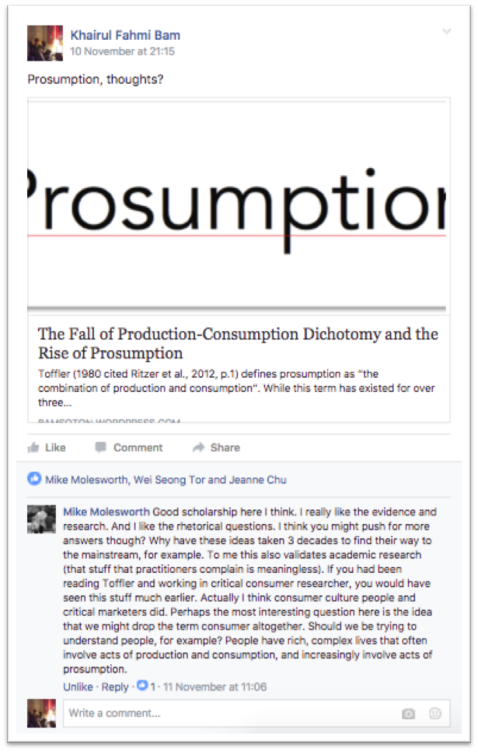MANG6262: Marketing in the 21st Century has relayed key themes that sets the basis for critical and reflective thinking. While there were various themes that were discussed over the course of 6 weeks, the author has presented a critical discourse on Consumer and Technology to exemplify contemporary marketing issues. This final post serves to address these two themes and how it implicates Marketing in the 21st Century. Upon addressing this, the author hopes to conclude the module by a critical reflection and how it will impact him as a marketing practitioner.
From the narrative of prosumption, the term coined by Toffler (1980 cited Ritzer et al., 2012) has seen itself rising from the discourse of the traditional dichotomy of production and consumption. While we reflect on the development of this narrative, it strikes a thought provoking question on its acceptance in the marketing discipline. Though it was believed to be a primordial term that has gained much scholarly attention today (Ritzer et al., 2012), the inertia on the acceptance of this terminology was still evident. As we strive to identify the reasons behind this inertia, Molesworth (2016) believes that this may validate academic research. He further reiterates that this may not entirely be a new theme that emerged as the critical discourse has always been within critical consumer research. Perhaps, there may be some validity in his idea of possibly dropping the term consumer altogether and focusing on people instead (see Figure 1).

Figure 1: Facebook comment on post on Prosumption by Molesworth (2016)
Marketing being a multi-disciplinary subject allows Anthropology, “study of human societies and cultures and their development” (Oxford Dictionaries, 2016) to find its way in marketing. From the development of this discipline, Ethnography eventually find its way in marketing research till the term “Netnography” was finally developed by Kozinets (2002). This may very well be the turning point in marketing research where the rise in the Web and social media permits the adoption of netnography in really understanding people (consumers). As Kozinets (2002, p.61) argue, recognizing the importance of online communities and the need to understand and identify “tastes, desires, relevant symbol systems, and decision making influences of particular consumers and consumer groups” are the two main reasons behind the development of this marketing research methodology. While this corroborates with the ideology behind prosumption, it seems that the inertia of dropping the term consumers all at once may be evident.
This extends the argument to technology, where Ritzer et al. (2012) believe that the development of technology as part of social change (technological determinism) has warrant scholarly attention to prosumption. As we have discussed, the risk of technological determinism is a double edged sword that may implicate Marketing in the 21st Century. Belk’s (2014) argument on digital changes such as dematerialization and re-embodiment have shed light on how technology determines the dynamic of marketing (or is it?). While the need to understand how the extended self in the digital world is vital, it is as important to divulge ourselves in the very nature of technology. This begs the question of whether technology has transformed marketing or vice versa. For instance, when dematerialization occurs, does technology inform marketing of its implications? (see example on Bruce Willis’ attempt to allow inheritance of his Apple iTunes music collection) Or when multiple identities are being presented in the digital sphere, how does marketing extract the very nature of consumers? These rhetoric permits a deeper and critical discourse beyond contemporary marketing issues being presented as buzzwords of digital marketing, marketing analytics or big data etc.
Ultimately, the two themes being discussed here were just a snippet of MANG6262: Marketing in the 21st Century. As we started out the journey by mapping the key themes involved, consumer and technology seem to strike the author the most as he believes that it’s central to the marketing discipline. The idea behind the assessment through blogging seem dubious to the author initially. However, as we immerse ourselves within the themes, it was a realization that blogging is merely a medium that allows critical and reflective narration of the knowledge we cultivate. In that, appreciation of the knowledge was beyond the assessment of this module. The Massive Open Online Course (MOOC) on Digital Marketing purports to instill an interaction between network of online learners from all over the world. Instead, the MOOC allowed us to appreciate face-to-face (F2F) interaction more in a lecture theatre setting as there are several drawbacks behind the technology. Despite this, the themes discussed were definitely relevant and did play a role in our thought processes in presenting our arguments in the blogs. This was also supplemented by the interaction on the Facebook group where the diversity of culture allowed us to have a more coherent view. With the delivery of this module, it develops confidence in stepping into the dynamics of marketing, how it is constantly evolving. Despite marketing theories being laid out for many years now, there are clearly more room for critical, innovative, creative and reflective narration behind those theories.
References:
Belk, R.W., 2014. Extended Self in a Digital World. Journal of Consumer Research, 40(3), pp.477–500. Available at: http://jcr.oxfordjournals.org/content/40/3/477.abstract.
Kozinets, R. V, 2002. The field behind the screen : Using netnography for marketing research in online communities. Journal of Marketing Research, 39(1), pp.62–72. Available at: http://journals.ama.org/doi/abs/10.1509/jmkr.39.1.61.18935.
Molesworth, M., 2016. Facebook Comment on post on Prosumption. Available at: https://www.facebook.com/groups/347325115434584/permalink/655713244595768/?comment_id=655941111239648¬if_t=group_comment¬if_id=1478862380362982.
Oxford Dictionaries, 2016. Definition of Anthropology. Oxford Dictionaries. Available at: https://en.oxforddictionaries.com/definition/anthropology.
Ritzer, G., Dean, P. & Jurgenson, N., 2012. The Coming of Age of the Prosumer. American Behavioral Scientist, 56(4), pp.379–398. Available at: http://abs.sagepub.com/content/56/4/379.short.